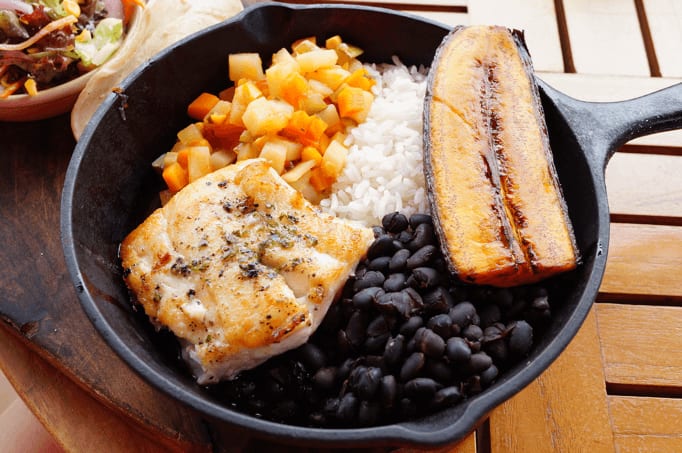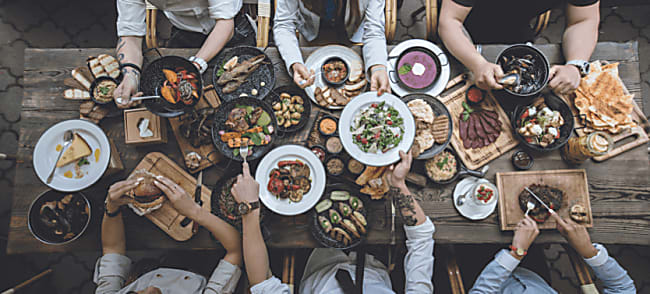Mindful Eating: A Personal Journey
Thu. Jul 18, 2019
Read in 11 minutes
This is my story of how I grew out of a rule-bound approach to eating.
I once accepted certain rules about eating, rules that had nothing to do with a healthy relationship with food.
These rules kept me from enjoying food fully, genuinely and in a way that was consistent with my other values.
In her essay “Philosophical Detection” Ayn Rand writes:
“To take ideas seriously means that you intend to live by, to practice, an idea that you accept as true. Philosophy provides man with a comprehensive view of life. In order to evaluate it properly, ask yourself what a given theory, if accepted, would do to a human life, stating with your own.”
That passage has inspired me to share this personal journey.
 The beach at Punta Cana
The beach at Punta Cana
Growing Up in the Dominican Republic
My mother is from the Dominican Republic. When I was little she and I would travel back to her hometown regularly.
On one of these trips, my family and I were driving back from the beach. I was enjoying a meal I had put off eating earlier.
Enjoyment of food contributes to joyous life.
Corruption is rife in developing countries like the Dominican Republic and it was not uncommon back then to have one’s car stopped by a police officer looking for a bribe.
On this particular day that is precisely what happened.
Saving the Best for Last
We were driving along our merry way when we were flagged over by a police officer standing by the side of the road.
He approached the car and started to chat with my aunt. At that point every adult in the car knew what the subtext was — “Give me some money or I’ll make getting back home difficult.”
All eyes stopped on my plate.
I remember my aunt apologizing to him about not having any money and asking him if he would accept some food as a sign of our respect.
This is when my ears perked up. The adults in the car started looking around to see if there was any left over food we could give the officer. All eyes stopped on my plate.
Savoring a Traditional Meal
As was my habit back then, I had divided my plate into little compartments.
Rice and beans in one section, well-seasoned roasted pork in another section, sweet plantains in another. I liked all the foods on this particular plate.
 Rice and beans with plantains and meat is one of my favorite dishes.
Rice and beans with plantains and meat is one of my favorite dishes.
The point of this separation wasn’t to pick out foods I refused to eat but to enjoy the foods in a particular order — from least to most favorite.
By the time we were stopped, I had enjoyed the pork and plantains and was really looking forward to my absolute favorite — the rice and beans.
Good Things Come to Those Who Wait?
Perhaps it had been my Mom telling me countless times that good things come to those who wait.
Perhaps it was the pride I took personally in being able to delay gratification.
My aunt grabbed my plate of food and gave it to the police officer.
I may never know exactly where and how I had absorbed the belief that you ought to save the best for last but that day I was about to discover the unintended consequences of holding on to that belief.
Reading the situation, I tried to lift the plate close to my face and started to lift a forkful of rice and beans to my mouth. But my aunt grabbed the plate from my hands and handed it to the police officer.
I protested in vain as my aunt pulled away from the side of the road in the hope that the officer would not protest the paltriness of the offering.
Mindful Eating: A Lesson in Enjoying Food
So what philosophic lesson did I draw from this? Well, for one, that police corruption sucks!
But more to the point, I learned that I shouldn’t approach eating with artificial rules. I should eat what I enjoy in a meal and enjoyment should be my focus from the start of the meal to the end.
I learned that I shouldn’t approach eating with artificial rules.
But if that had been the only lesson I had ever learned about eating I would have developed into a hedonist and that would have been good neither for my waistline or long term health.
Eating, one of life’s greatest delights, ought to be enjoyed fully.
But eating, even when enjoyed with another of life’s great delights — great conversation — is not the only thing that makes life worthwhile.
A Holistic View of Food: Part of a Flourishing Life
Food is something we enjoy alongside many other values that taken together as an integrated whole, make our lives joyous.
Eating, one of life’s greatest delights, ought to be enjoyed fully.
We cannot decide the true value of something by itself, but only with an understanding of how it contributes, alongside a multitude of other values large and small, to a flourishing life.
The Red Birthday Bicycle
So let me share a second story. My birthday was quickly approaching and I had asked my Mom for this bicycle I had seen.
Colorful tassles streamed from the handlebars.
It was bright red with racing stripes down its sides. It had this loud bell you could ring to warn people that you were speeding towards them and colorful tassels streaming from each handle.
Now that I’m sharing this it occurs to me that the tassels were a rather effeminate touch but because two wonderful women raised me, my mother and grandmother, I guess it makes sense that I developed some feminine sensibilities as a boy.
Joining the Clean Plate Club
Well even though I had learned my lesson about burdening my eating with a lot of artificial rules, I venerated these two women and they had raised me to be a member in good standing of the clean plate club.
I’m sure that some of you can relate.
I think it was especially common for children whose parents grew up in the shadow of the Great Depression to believe that it was virtuous to clean their plate every time they ate.
What About Those Starving Kids?
I was told that by cleaning my plate, I was saying that food is precious and should never be wasted.
Being a member of the clean plate club meant I ate far in excess of what my body needed.
I was told to empathize with the starving kids of India and to be thankful that I had plenty to eat. These starving kids would be to eat the scraps off of my plate, my family said.
Battles Over Food I Didn’t Like
Even so, there were many times when I fought my parents about some food I didn’t want to eat.
A pitched battle ensued until I had either eaten everything or had found another way to miraculously make the noxious food disappear.
I remember being particularly stubborn around this time, as my birthday approached, about avoiding foods on my plate that I “didn’t like”.
Finances Were Tight
The night before my birthday that year, my mother sat by my bedside and told me that things were tight financially and that the bike might not be possible that year.
Our subconscious paints on the tapestry of our dreams.
She didn’t draw a connection between that decision and my “being a fussy eater” or my refusing to clean my plate.
In other words this was not a punishment. I was merely led to understand that she might not be able to afford the bike that year.
But kids have a way of drawing connections between things that are often unrelated and our subconscious minds are particularly adept at drawing these connections — even when they are entirely imaginary.
And our dreams are the perfect tapestry upon which our subconscious paints.
The Bike that Almost Got Away
That night I had a recurring nightmare all night long.
I dreamt that somewhere in India, a kid was riding up and down a street on my red bike, ringing the bell gleefully while stuffing his face with rice and beans.
I awoke to see the gleaming new bike at the foot of my bed so in the short term this story has a happy ending.
But for many years after that, all the way into my college years I was a faithful plate cleaner.

Being Good = Eating Too Much?
I never did figure out how I was empathizing with starving kids or how they would have ever been aware of my gesture.
But I do remember putting on a lot of unnecessary fat in the process.
Wherever I went, the portion sizes of the meals I was served where often comparable to the mounds of food I was required to eat at home.
I had to learn to eat when I’m hungry and stop when I’m satisfied.
Being a member of the clean plate club meant I ate far in excess of what my body needed.
The fact that I had been playing tennis for hours each day as a member of my high school and college team disguised the weight gain that is a natural consequence of over-consumption.
Packing on Pounds in College
But as soon as I quit the tennis team to devote myself to my college studies, the pounds came on rapidly.
By the time I was a senior, I had gone from the 185 lbs. I had maintained throughout high school to nearly 270 pounds.
You can’t flex fat.
And I knew it wasn’t “all muscle” from my weight training efforts. I knew that you can’t flex fat.
So this lesson — that I should eat when I’m hungry and stop eating when I’m satisfied took a long time for me to learn and consistently practice.
Empathy and False Guilt
Again, thanks to being raised by my mother and grandmother, I developed a great deal of empathy for the suffering of others.
I labored under an undeserved sense of guilt over the suffering of others.
Should You Feel Guilty the Good In Your Life?
As someone growing up in a prosperous city within a prosperous country and with nothing but first world problems to confront, I labored under an undeserved sense of guilt over the suffering of others.
Atonement, Duty and Appreciation
I then attempted to atone for that undeserved guilt by approaching things I enjoyed, such as eating, in a very duty-bound way.
Although I knew that if I was concerned with starving kids in India or anywhere, I could help them directly via charity.
I approached eating in a duty-bound way.
But it didn’t occur to me till much later that if I didn’t want to waste food, I should limit the portion I served myself, not swallow everything cooked indiscriminately.
Even until recently, after the original motivation to help the starving kids in India had long been subsided, I occasionally found myself wanting to clean my plate in order to let my Mom, Grandma or a host know I really enjoyed their cooking.
Here the motivation is not a sense of duty, but rather a sense of appreciation for the person who put so much effort to make something you would enjoy.
It seems ungrateful and unjust to not eat everything your host has made, doesn’t it?
Love and Appreciation Don’t Require Sacrifice
But as I came to discover, love and appreciation is not about sacrificing one’s values, including one’s health.
I’ve since grown comfortable accepting that you can love the meal someone has made for you and appreciate the effort they have made to nurture you in this way, without having to wear the fat induced from over-eating.
You don’t have to sacrifice your values.
Instead of eating more than you want to, you can show appreciation for your host’s cooking by:
- Asking for the recipe
- Asking for leftovers to take home.
Enjoy Food With No Regrets
If you truly enjoy someone’s cooking, you want to be able to enjoy without the tinge of regret.

You want to be able to say, “I really enjoyed that meal” without having to feel miserable about how your clothes feel afterwards or with the indigestion that keeps you up all night.
Honor your host and yourself.
The goal as I’ve come to see it is to experience the joy of someone’s nurturing you with food without having to bear the costs of overeating.
When we have accepted another’s loving nourishment without cost to our health and self-esteem, only then are we genuinely honoring our host.
Postscript
If you have questions about diet, fat loss, or exercise, feel free to schedule a phone appointment with me, Francisco Villalobos, owner of Inner Strength Fitness.
Or drop me a line and we can schedule an in person meeting.
Personal training is my passion.
Photo credits: Beach at Punta Cana by aero-pictures.de; Table of food by Olga Klochanko; Rice and beans by Eqroy; Red bicycle by PiyawatNandeenoparit; all from Adobe Stock, via Standard License